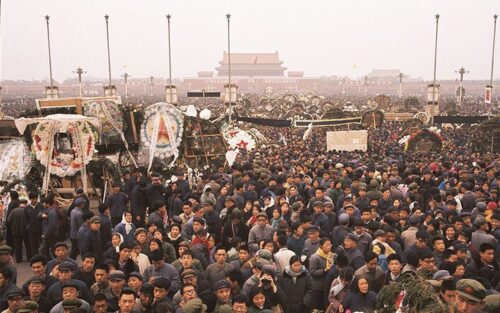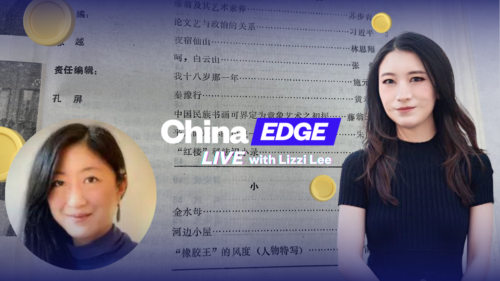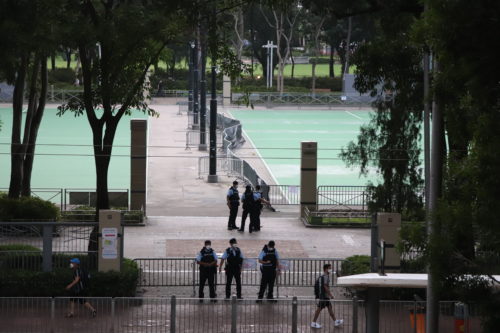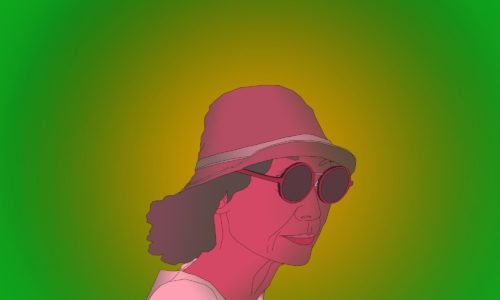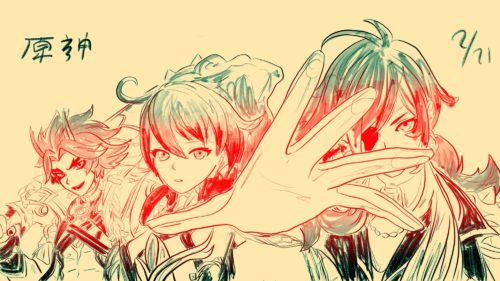Friday Song: Who owns ‘Bloodstained Glory,’ the dissidents or the patriots?
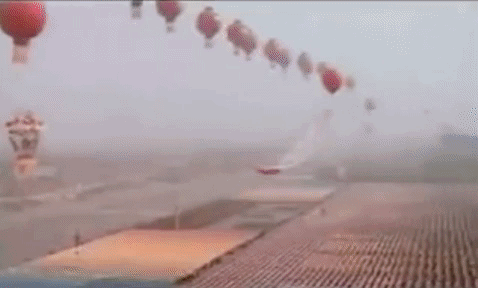
“Bloodstained Glory” is inconceivable: a song claimed by China’s most zealous patriots and its most ardent dissidents as representing both of their conflicting causes.
The song was commissioned by the Chinese government in 1987 to commemorate the thousands of PLA soldiers who died during the 1979 Sino-Vietnamese War. It takes the form of a letter from a soldier reassuring his lover that death is a worthwhile sacrifice for the country. The original version was a rapturously received duet at the 1987 CCTV Spring Festival Gala between an injured veteran, Xu Liang 徐良, and the famous singer Mao Amin 毛阿敏.
Then, at the 1989 Tiananmen Square protests, Bloodstained Glory was sung by the protesters to extol their revolutionary pro-democracy movement. Canto-pop superstar Anita Mui 梅艳芳 provided a rendition at the 1989 Hong Kong Concert for Chinese Democracy, which aimed to raise funds and show solidarity for the protesters. It’s her voice in the embedded video above.
Singing such a patriotic song was not without controversy, though, as student activist Rowena Xiaoqing He 何晓清 writes in her book Tiananmen Exiles:
…dissidents of an earlier generation interrupted us when we started to sing “Bloodstained Glory”… Those moments of contradiction are symptomatic of the Tiananmen Generation: born toward the end of Mao’s Cultural Revolution and growing up at the beginning of Deng’s reform era, they were under the influence of both the Communist ideology as promoted in the revolutionary stories and also of the new individualistic ideas that abounded in the political writings of the time.
In the wake of the bloodshed after the violent crackdown on the protests, the contents of the song — fighting for a cause to the bitter end, death, even the phrase “bloodstained glory” (血染的风采 xuè rǎn de fēngcǎi) itself — became all the more resonant. Bloodstained Glory was adopted as the anthem of the annual candlelight vigil in Hong Kong to remember the Tiananmen Square protests.
But how is it possible that a song that is sung by throngs of people gathered in Hong Kong every June 4 to mark a pro-democracy movement has also recently been covered by China’s First Lady, Peng Liyuan 彭丽媛?
https://www.youtube.com/watch?v=weKJw49svKA
The fact that this song continues to be claimed by such diametrically opposed groups speaks to its more profound meaning: it transcends political divides and gives tribute to the revolutionary spirit of the Chinese people. Bloodstained Glory could be describing the PLA soldiers’ sacrifice during the 1979 Sino-Vietnamese War or the plight of the 1989 Tiananmen Square protesters, but it could also, very easily, be describing the toils of the Communists on their Long March in 1934, the efforts of Sun Yat Sen 孙中山 to found the new Chinese Republic in 1911, the bravery of the intellectuals who were executed for their proposals during the Hundred Days’ Reform in 1898, or many other events in modern Chinese history.
Revolutionary activity has had many faces and been propelled by many markedly different ideologies. Much of the time, the different groups have been in direct opposition of one another. But what they all have in common, and what is recognized in Bloodstained Glory, is their unwavering spirit to keep fighting for the cause they believe in, no matter the hardship that has to be endured.
The lyrics:
也许我告别将不再回来,
Perhaps I bid farewell, never again to return
你是否理解?
Can you comprehend?
你是否明白?
Can you understand?
也许我倒下再不能起来,
Perhaps I fall, never again to rise,
你是否还要永久的期待?
Will you be forever waiting?
如果是这样,你不要悲哀,共和国的旗帜上有我们血染的风采。
If it is to be so, grieve not: on the flag of the Republic is our blood-stained glory.
如果是这样,你不要悲哀,共和国的旗帜上有我们血染的风采。
If it is to be so, grieve not: on the flag of the Republic is our blood-stained glory.
也许我的眼睛再不能睁开,
Perhaps my eyes, never again to open,
你是否理解我沉默的情怀?
Will you be forever waiting?
也许我长眠再不能醒来,
Perhaps I sleep forever, never again to wake,
你是否相信我化作了山脉?
Will you believe I have transformed into mountains?
如果是这样,你不要悲哀,共和国的土壤里有我们付出的爱。
If it is to be so, grieve not: the soils of the Republic contain the love we have given.
如果是这样,你不要悲哀,共和国的土壤里有我们付出的爱。
If it is to be so, grieve not: the soils of the Republic contain the love we have given.
如果是这样,你不要悲哀,共和国的旗帜上有我们血染的风采。
If it is to be so, grieve not: on the flag of the Republic is our blood-stained glory.
如果是这样,你不要悲哀,共和国的旗帜上有我们血染的风采。
If it is to be so, grieve not: on the flag of the Republic is our blood-stained glory.
And in case you didn’t click through earlier, below is the 1987 Spring Festival version. Worth it just to see how understated, influential, and good the CCTV Spring Festival Gala used to be.
Friday Song is SupChina’s weekly sign-off. Let us know what you thought of the week that was in the comments below, or email editors@thechinaproject.com.
